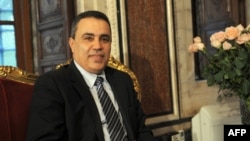TUNIS —
Tunisia's new premier Mehdi Jomaa took office on Friday to lead a caretaker government until elections this year after the ruling Islamist party's premier resigned in a deal to complete the country's transition to democracy.
Jomaa, a former industry minister, will head a non-partisan cabinet after compromise between the Islamists and secular opponents to end a political crisis three years after Tunisia's uprising against autocrat Zine el-Abidine Ben Ali.
The small North African nation is closer to establishing a full democracy after its 2011 revolt than other “Arab Spring” countries, especially Egypt, whose Islamist president faces trial after he was ousted by the military.
Jomaa, who ran an aerospace parts business in Paris before he become minister, must tackle economic reforms sought by international lenders to curb the deficit and face a growing threat from Islamist militants.
“I am not a miracle worker, but I promise I will do my best we are doing everything possible to overcome hurdles, to reform what we can reform, and bring back stability,” Jomaa told reporters in the presidential palace.
The former premier, Ali Larayedh, an Islamist who spent years in jail under Ben Ali, resigned on Thursday. Jomaa will name his cabinet over the next few days.
Since the agreement reached late last year for a handover to a technocrat administration, Tunisia has progressed. The national assembly is voting on the new constitution and a nine-member election commission has been appointed.
But many Tunisians are worried about the high cost of living and some see little economic opportunity three years after the uprising that inspired revolts against long-standing autocrats in Egypt, Libya and Yemen.
One of the most secular countries in the Arab world, Tunisia struggled with divisions over the role of Islam and the rise of militants since its uprising. But the assassination of two opposition leaders last year triggered a crisis.
Jomaa, a former industry minister, will head a non-partisan cabinet after compromise between the Islamists and secular opponents to end a political crisis three years after Tunisia's uprising against autocrat Zine el-Abidine Ben Ali.
The small North African nation is closer to establishing a full democracy after its 2011 revolt than other “Arab Spring” countries, especially Egypt, whose Islamist president faces trial after he was ousted by the military.
Jomaa, who ran an aerospace parts business in Paris before he become minister, must tackle economic reforms sought by international lenders to curb the deficit and face a growing threat from Islamist militants.
“I am not a miracle worker, but I promise I will do my best we are doing everything possible to overcome hurdles, to reform what we can reform, and bring back stability,” Jomaa told reporters in the presidential palace.
The former premier, Ali Larayedh, an Islamist who spent years in jail under Ben Ali, resigned on Thursday. Jomaa will name his cabinet over the next few days.
Since the agreement reached late last year for a handover to a technocrat administration, Tunisia has progressed. The national assembly is voting on the new constitution and a nine-member election commission has been appointed.
But many Tunisians are worried about the high cost of living and some see little economic opportunity three years after the uprising that inspired revolts against long-standing autocrats in Egypt, Libya and Yemen.
One of the most secular countries in the Arab world, Tunisia struggled with divisions over the role of Islam and the rise of militants since its uprising. But the assassination of two opposition leaders last year triggered a crisis.





